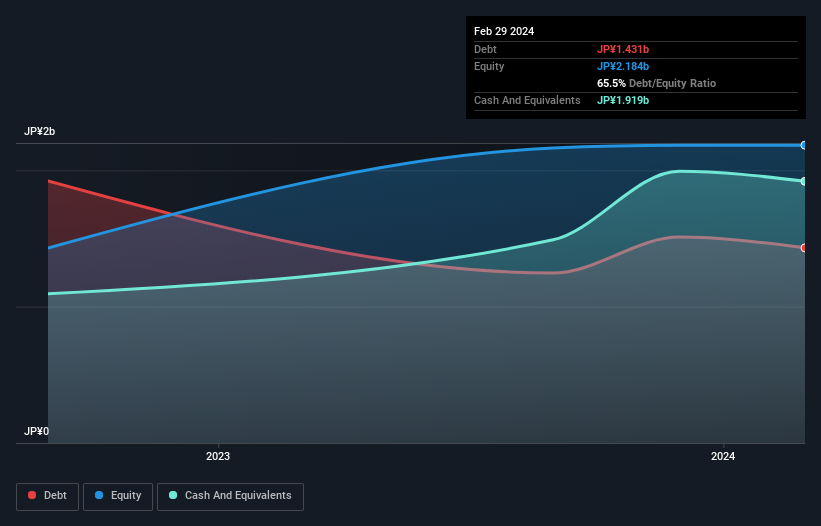- Japan
- /
- Professional Services
- /
- TSE:4015
These 4 Measures Indicate That Paycloud Holdings (TSE:4015) Is Using Debt Safely
David Iben put it well when he said, 'Volatility is not a risk we care about. What we care about is avoiding the permanent loss of capital.' So it seems the smart money knows that debt - which is usually involved in bankruptcies - is a very important factor, when you assess how risky a company is. We can see that Paycloud Holdings Inc. (TSE:4015) does use debt in its business. But the more important question is: how much risk is that debt creating?
When Is Debt A Problem?
Generally speaking, debt only becomes a real problem when a company can't easily pay it off, either by raising capital or with its own cash flow. Part and parcel of capitalism is the process of 'creative destruction' where failed businesses are mercilessly liquidated by their bankers. While that is not too common, we often do see indebted companies permanently diluting shareholders because lenders force them to raise capital at a distressed price. Of course, the upside of debt is that it often represents cheap capital, especially when it replaces dilution in a company with the ability to reinvest at high rates of return. When we think about a company's use of debt, we first look at cash and debt together.
Check out our latest analysis for Paycloud Holdings
How Much Debt Does Paycloud Holdings Carry?
As you can see below, Paycloud Holdings had JP¥1.43b of debt at February 2024, down from JP¥1.92b a year prior. However, its balance sheet shows it holds JP¥1.92b in cash, so it actually has JP¥488.0m net cash.

How Strong Is Paycloud Holdings' Balance Sheet?
According to the last reported balance sheet, Paycloud Holdings had liabilities of JP¥1.30b due within 12 months, and liabilities of JP¥939.0m due beyond 12 months. On the other hand, it had cash of JP¥1.92b and JP¥411.0m worth of receivables due within a year. So it can boast JP¥95.0m more liquid assets than total liabilities.
Having regard to Paycloud Holdings' size, it seems that its liquid assets are well balanced with its total liabilities. So while it's hard to imagine that the JP¥7.15b company is struggling for cash, we still think it's worth monitoring its balance sheet. Succinctly put, Paycloud Holdings boasts net cash, so it's fair to say it does not have a heavy debt load!
Better yet, Paycloud Holdings grew its EBIT by 136,775% last year, which is an impressive improvement. That boost will make it even easier to pay down debt going forward. When analysing debt levels, the balance sheet is the obvious place to start. But it is Paycloud Holdings's earnings that will influence how the balance sheet holds up in the future. So when considering debt, it's definitely worth looking at the earnings trend. Click here for an interactive snapshot.
But our final consideration is also important, because a company cannot pay debt with paper profits; it needs cold hard cash. Paycloud Holdings may have net cash on the balance sheet, but it is still interesting to look at how well the business converts its earnings before interest and tax (EBIT) to free cash flow, because that will influence both its need for, and its capacity to manage debt. Happily for any shareholders, Paycloud Holdings actually produced more free cash flow than EBIT over the last two years. There's nothing better than incoming cash when it comes to staying in your lenders' good graces.
Summing Up
While it is always sensible to investigate a company's debt, in this case Paycloud Holdings has JP¥488.0m in net cash and a decent-looking balance sheet. And it impressed us with free cash flow of JP¥370m, being 168% of its EBIT. So we don't think Paycloud Holdings's use of debt is risky. When analysing debt levels, the balance sheet is the obvious place to start. However, not all investment risk resides within the balance sheet - far from it. Be aware that Paycloud Holdings is showing 4 warning signs in our investment analysis , you should know about...
If you're interested in investing in businesses that can grow profits without the burden of debt, then check out this free list of growing businesses that have net cash on the balance sheet.
New: Manage All Your Stock Portfolios in One Place
We've created the ultimate portfolio companion for stock investors, and it's free.
• Connect an unlimited number of Portfolios and see your total in one currency
• Be alerted to new Warning Signs or Risks via email or mobile
• Track the Fair Value of your stocks
Have feedback on this article? Concerned about the content? Get in touch with us directly. Alternatively, email editorial-team (at) simplywallst.com.
This article by Simply Wall St is general in nature. We provide commentary based on historical data and analyst forecasts only using an unbiased methodology and our articles are not intended to be financial advice. It does not constitute a recommendation to buy or sell any stock, and does not take account of your objectives, or your financial situation. We aim to bring you long-term focused analysis driven by fundamental data. Note that our analysis may not factor in the latest price-sensitive company announcements or qualitative material. Simply Wall St has no position in any stocks mentioned.
About TSE:4015
Paycloud Holdings
Provides various technology solutions in Japan and internationally.
Excellent balance sheet and fair value.
Market Insights
Community Narratives



